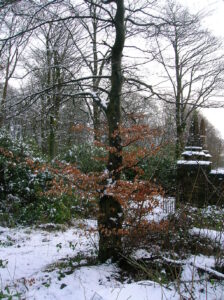 My wife Nancy gets credit for this post, when she pointed out how the Beech trees in our woods hold their leaves all winter. Oaks do for a while, too, after the first cold snap. Nan informed me that this quality of some plants is called marcesence.
My wife Nancy gets credit for this post, when she pointed out how the Beech trees in our woods hold their leaves all winter. Oaks do for a while, too, after the first cold snap. Nan informed me that this quality of some plants is called marcesence.
I’m a tree lover, not a scientist, so this quality of some plants appealed to me when their marcescent leaves rattle in the wind. The OED entry gives that adjective a “Band 2” in usage, meaning it keeps company with “words which occur fewer than 0.01 times per million words in typical modern English usage.” As lexical items go, in English it’s a newcomer, dating to scientific usage in the 18th Century, with (as we can hear when we say it) a Latin progenitor meaning to wither.
I’m certain any faculty who teach botany use our word more frequently. The quality of marcescence may, as the Wikipedia entry notes, protect the plant from large browsing herbivores who otherwise would much on twigs and smaller branches.
No offense to them and their work, but it’s a word we Humanists should steal. It has an onomatopoeic sound, like the murmuring of dry Beech leaves. Our word is rife with metaphor, particularly at the start of a new semester.
Do you have any old leaves you need to shed? Or ones to hold onto that may protect you until Spring?
As Tennyson says in one of the poems that can be found his Arthurian epic Idylls of the King, “the new leaf ever pushes off the old.” Soon we and those trees clinging to their leaves won’t have a choice.
Hello, January.
Nominate a word students need to learn by e-mailing me (jessid -at- richmond -dot- edu) or leaving a comment below.
See all of our Metaphors of the Month here and Words of the Week here.
Image of partially marcescent Beech courtesy of Wikipedia.